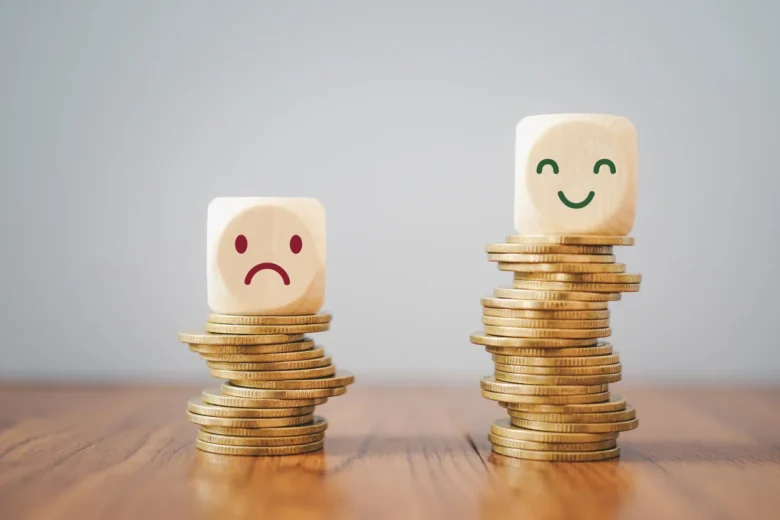Since money is essential in achieving one’s needs and goals, it is central in our daily lives. However, money negatively impacts people’s lives by causing and losing balance in life. Financial stress, paying bills, debt, insufficient savings, and low income are common financial issues that people often overlook in terms of their impact on well-being. We tend to focus excessively on managing our finances to improve our lives, neglecting the need to balance stress and happiness in order to effectively address any problems.
The Mental Strain of Financial Worries
Mental health is the first factor affected by the financial stress. It is a fact that people who are stressed about paying the bills are in a losing situation. Deep financial pressure makes one feel paralyzed. Being closed in their world is a mental drain. When an individual thinks of too many negative things, it is believed that they lose motivation in reality, making small challenges feel monumental. To break it down easily, prolonged stress and the brain having mental strain snap places money in the fear region. This is the cue our brain is resting on.
The Physical Effects of Stress
Stress is not only psychological. It is often associated with physical stress; financial worry is a common thing physical stress. It is a known fact that physical stress often becomes psychological. When one experiences a debt, stress gaps, and the mental stress, think lines, blood, and. Stress has a direct correlation with. It has also been. Illness is mental. It is nothing above a courtesy. Weight in Pounds. The Bottom of Stressed.
The Mental Effects of Stress, Specifically on Performance
The need to eat is crucial for maintaining effective performance in flexible work arrangements. Burnouts can be caused by both mental and financial stress. The form of payment is by one of the money. The. In cases where stress is the norm, absence from work becomes accepted. This is true even when the work is compensated. It is also earned. It is a known fact that stress increases the risk of a range of physical health issues. A lot is required to address this. Stress is a systematic issue that ultimately makes it harder to achieve satisfaction.
The Cycle of Bad Habits
People often pursue help and happiness through unhealthy means. For someone financially stressed, smoking, drinking, or overeating are just some of the things people might do. None of these activities are good for physical health and are accompanied by financial expenses as well. On the other side, people neglect their health by skipping appointments, eating unhealthy and cheap foods, and reducing their physical activity—all of which are contradictory to well-being.
The Emotional Burden of Debt
Almost everyone has some form of financial debt. It tends to be credit cards, student loans, or unpaid bills. It can also be extremely emotional and shameful, which heavily impacts self-esteem. Debt tends to weigh people down and makes them feel as though life is unable to be exciting. In any case, health and happiness are sacrificed due to debt.
How Stress Lowers Happiness
Most of the time, stability and peace of mind are associated with happiness. The moment stress enters the picture, especially pertaining to money, it takes away the ability of some people to enjoy life. Constant worries about the finances make it difficult to have the positive experiences that are available. People may find it difficult to loosen up, celebrate achievements, or enjoy the company of friends and family. Gradually, this creates a net positive satisfaction in life, and it creates a cloud that blocks joy.
Finding a Healthy Balance and Relief
It is common to experience the burden of money stress, but there is no need to permanently bear it, especially pertaining to health and happiness. Taking small and rigid steps can change the status quo. Keeping a record about how money is spent, attaining professional help, or learning how to effectively manage money can help mitigate a sense of chaos and restore a feeling of control. Engaging in exercise, meditation, or spending time with compassionate family and friends can improve cognitive function and physiological health. Even small shifts in managing finances can help regain lost confidence, fostering a positive outlook toward life.
Conclusion
Stressing about money is more than just worrying about the bank account; it’s also about the mental condition, physical condition, the focal point of socializing, and general happiness. If money is spent trivially, and there’s no work/life balance, health deteriorates, relationships become distant, and happiness ends up in the toilet, and eventually, the vicious cycle begins. Recognizing the roots and working toward resolving the cause of the financial stress is always the best way to go. People usually regain their peace of mind better this way. It is okay to feel that mental peace is more important; achieving mental and financial stability both will take the course of time. It is reality; money serves to be spent. Prioritizing health and happiness at all costs is equally important. A balance needs to be established between health and happiness.
FAQs
1. What are common signs of money stress?
A person’s mind is usually at ease since they adopt an attitude of stopping worrying about the things that they cannot control. People worrying about bills, loss of sleep, tension of the mind, anxiety, and fighting, I suppose, are classic signs of financial stress.
2. Can money stress cause physical illness?
It can. As an example, long-term mental peace, problem sleep, weak immunity, and the list just goes on.
3. How does financial stress affect relationships?
Less social activity, and certain bonds are always tight, not just to the partner, but to the family and friends as well.
4. What are healthy ways to manage money stress?
Simple things like budgeting, financial advice, exercise, meditation, and open discussion with family, friends, and trusted loved ones are all healthy ways to manage money stress.
5. Can a person be happy without being financially stable?
Of course, money does equate with security, but happiness comes from emotional stability, interpersonal relationships, and balance more than anything else.


